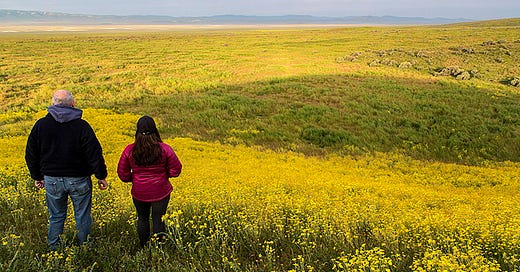The fields and hillsides in California are full of vibrant colors this spring thanks to an abundance of recent snow and rain that fueled a “super bloom” of wildflowers. There are so many flowers they can be seen via satellite from space.
“California wildflowers spend much of their time as seeds, just dormant in the soil, waiting for the perfect conditions for them to germinate and grow and bloom,” Sara Kimball, a professor at the University of California at Irvine, told CNN. The perfect conditions are prolonged drought and wildfires that kill grasses, followed by lots of water to get nutrients to the seeds.
Here’s another way of putting it, with a spiritual application: God gives the increase in nature, just like He does in the soul of man. Even when circumstances for growth may seem bleak to us, a super bloom of faith, hope and love (I Corinthians 13:13) could be in God’s making.

The potential for spiritual growth always exists within men and women who are made in God’s image. Jesus saw that potential during His ministry and taught His disciples to look for it.
“Seeing the crowds, He felt compassion for them, because they were distressed and downcast, like sheep without a shepherd,” Matthew recounted in his gospel (9:36-38). “Then He said to His disciples, ‘The harvest is plentiful, but the workers are few. Therefore, plead with the Lord of the harvest to send out workers into His harvest.’”
One time when His disciples urged Him to eat, Jesus made a similar point about the harvest by turning the conversation instead to His purpose (John 4:34-36). “My food is to do the will of Him who sent Me, and to accomplish His work,” Jesus said. “Do you not say, ‘There are still four months, and then comes the harvest’? Behold, I tell you, raise your eyes and observe the fields, that they are white for harvest.”
As Jesus’ followers today, we also have to open our eyes to see the fields of promise before us. Then we have to work the fields until they are ready to harvest. That work includes scattering the seed wherever we can. Look for every opportunity to talk about Jesus and introduce others to the saving grace available through Him.
The sower in Jesus’ parable wasn’t particular about where he scattered the seed (Matthew 13:3-9, 18-23). He gave it a chance to grow in all kinds of environments — by the road, in rocky soil, among the thorns and in good soil.
Yes, the seeds dropped by the road, which represented people who hear the truth but don’t understand it, became food for the birds. The seeds in the rocky soil sprouted immediately but died in the scorching sun, like people who lose faith amid affliction and persecution. And the seeds that sprouted among thorns eventually were choked to death, a metaphor for those who succumb to worldly anxiety or the deceitfulness of wealth. But the sower did his job well and left the rest to God.
Just remember what happened to all the seeds in the good soil. They yielded crops at varying rates, from 30 to 100 times as much as the seeds that landed in less fertile soil. “This is the one who hears the word and understands it, who indeed bears fruit and produces,” Jesus said.
The vitality of every spiritual seed obviously depends on the condition of the soil where it falls. It may well lie dormant for years like California wildflowers. But we need to heed the examples of Paul and Apollos in Corinth (I Corinthians 3:5-9). Plant the seed, water it, and be patient as God gives the increase in His time.
Learn about the inspiration behind The Bible and the Internet.
Keep reading with a 7-day free trial
Subscribe to The Bible and the Internet to keep reading this post and get 7 days of free access to the full post archives.



